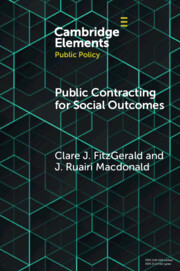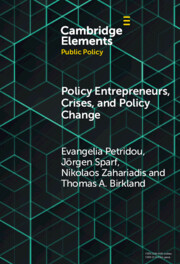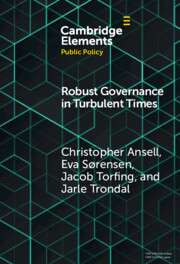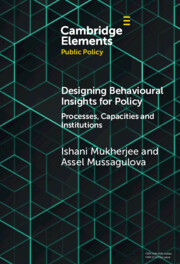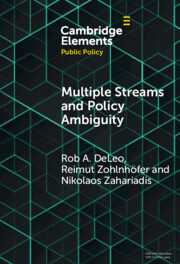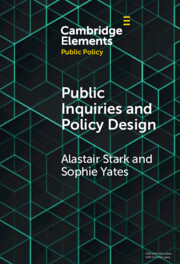About this Cambridge Elements series
The Cambridge Elements in Public Policy is a major publishing initiative designed to develop a concise yet authoritative collection of assessments of the state of the art and future research directions in public policy research as well as substantive new research on key topics.
Edited by leading scholars in the field, the series is an ideal medium for reflecting on and advancing the understanding of critical issues in the public sphere. Collectively, the series provides a forum for broad and diverse coverage of all major topics in the field while integrating different disciplinary and methodological approaches.
The series delivers both quality and timeliness: manuscripts undergo rigorous peer review but then are fast-tracked after formal acceptance so that they may appear quickly and lead research efforts in the field. Authors can develop a theme in greater detail without writing a full-length book as the length of an Element is approximately 25,000 words. Elements will be updatable, with the latest functionality on Cambridge’s new institutional platform (Core), as well as being available via low-priced print-on-demand (POD).
Elements in this series
-
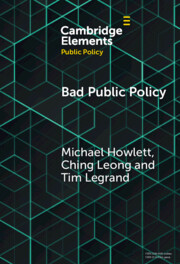
- Element
Bad Public Policy
-
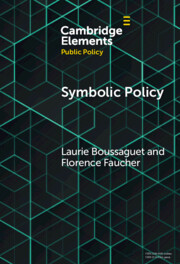
- Element
Symbolic Policy
About the Editor - M. Ramesh
M. Ramesh is Professor of Social Policy at the Lee Kuan Yew School of Public Policy, National University of Singapore (NUS). He previously worked at the University of Hong Kong, University of Sydney, University of New England, and Victoria University of Wellington. His research focusses on social policy in East and Southeast Asia, in addition to public policy institutions and processes. His books and journal articles on social policy in Asia are the standard starting points for research on the subject. He has published extensively in reputed international journals and is co-editor of Policy and Society.
About the Editor - Michael Howlett
Michael Howlett is Burnaby Mountain Chair in the Department of Political Science, Simon Fraser University and Yong Pung How Chair Professor at the Lee Kuan Yew School of Public Policy, NUS. He specializes in public policy analysis, political economy, and resource and environmental policy. He previously served as co-editor of the Canadian Journal of Political Science and World Political Science Review. Most recently, he was associate editor of the Journal of Natural Resources Policy Research and administrative editor of Canadian Political Science Review. He is currently editor-in-chief of Policy Sciences and is co-editor of the Journal of Comparative Policy Analysis and Policy and Society. He also chairs RC30 (Comparative Public Policy) of IPSA and sits on the Executive of the ICPP.
About the Editor - Eduardo Araral
Eduardo Araral specializes in the study of the causes and consequences of institutions for collective action and the governance of the commons. He is widely published in various journals and books and has presented in more than ninety conferences. Ed was a 2021–22 Fellow at the Center for Advanced Study of Behavioral Sciences, Stanford University. He has received more than US$6.6 million in external research grants as the lead or co-PI for public agencies and corporations. He currently serves as a Special Issue Editor (collective action, commons, institutions, governance) for World Development and is a member of the editorial boards of Water Economics and Policy, World Development Sustainability, Water Alternatives and the International Journal of the Commons.
Contact the Editors
If you would like more information about this series, or are interested in writing an Element, email: PublicPolicyElements@cambridge.org
Areas of interest
The series is currently divided into three thematic clusters with more to be added in future:
- Approaches, Methods and Techniques of Policy Studies
- Policy Institutions and Processes
- Policy Appraisal and Evaluation
These clusters allow coverage of wide range of specific topics, including essays on basic and advanced theories and concepts in the field, those concerned with the methods and practices of policy analysis, and those related to sectoral, national, international, and comparative policy-making.
About the Editor - Xun WU
Xun WU is currently a Professor at the Innovation, Policy and Entrepreneurship Thrust at the Society Hub of Hong Kong University of Science and Technology (Guangzhou). He is a policy scientist with a strong interest in the linkage between policy analysis and public management. Trained in engineering, economics, public administration, and policy analysis, his research seeks to make contribution to the design of effective public policies in dealing emerging policy challenges across Asian countries.
About the Editor - Judith Clifton
Judith Clifton is Professor of Economics at the University of Cantabria, Spain, and Editor-in-Chief of Journal of Economic Policy Reform. Her research interests include the determinants and consequences of public policy across a wide range of public services, from infrastructure to health, particularly in Europe and Latin America, as well as public banks, especially, the European Investment Bank. Most recently, she is principal investigator on the Horizon Europe Project GREENPATHS (www.greenpaths.info) on the just green transition.

